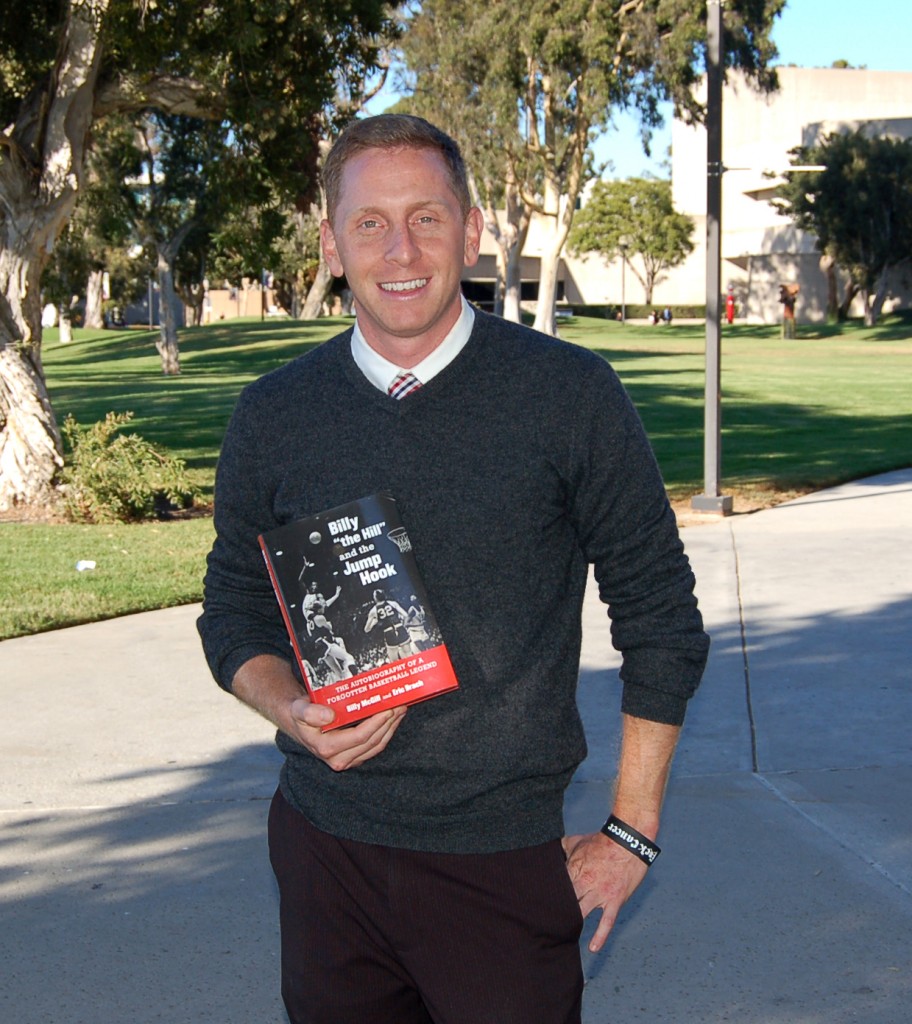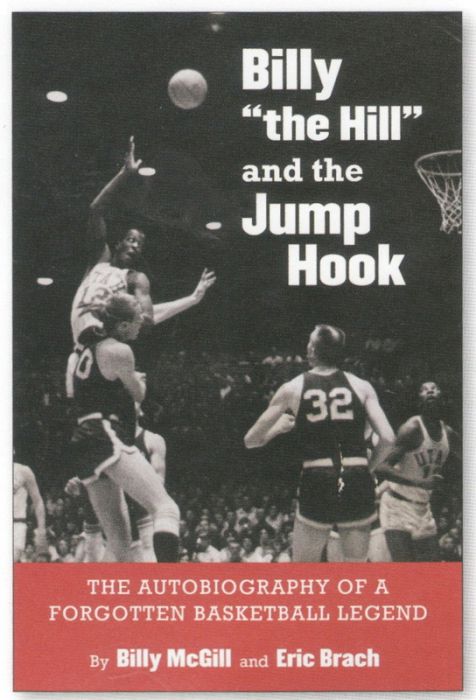
Billy McGill may well be “the greatest NBA (National Basketball Association) player you’ve never heard of.” But with the help of Eric Brach, a lecturer of English at California State University, Dominguez Hills, his story is being brought to light.
The two have paired to co-author “Billy ‘the Hill’ and the Jump Hook: The Autobiography of a Forgotten Basketball Legend” (University of Nebraska Press, November 2013), which recounts the against-the-odds rise and precipitous fall of McGill, who is the only No. 1 NBA draft pick ever to come out of Los Angeles and the inventor of one of basketball’s staple moves–the jump hook shot.
The University Library will present a book signing and discussion with Brach and McGill on Thursday, Nov. 14 at noon, on the fifth floor of the University Library South Wing. Copies of “Billy ‘the Hill’ and the Jump Hook” will be on sale at the event. The book is also available through the University Bookstore while supplies last and Amazon.com.
Update: the location of the book signing has changed to the University Library Multicultural Art Center, Rm 1940, ground floor of the University Library South Wing
“It’s an inspiring story about basketball and growing up in L.A.” Brach said of the book. “It’s also a story about the dangers of neglecting academics even while pursuing athletic dreams.”
Despite racial discrimination, not only was McGill the first African American to play basketball at the University of Utah, he also became a beloved and revered athletic hero.
“He integrated a team, and he changed people’s attitudes for the better. And while doing this, he set NCAA scoring records that have still never been broken,” Brach remarked.
In the semester just before graduating, McGill left the university to play professional basketball, first in the NBA–drafted No. 1 overall in 1962–and then the American Basketball League (ABA), but after five years bouncing from team to team, an underlying knee injury would lead to his undoing. Without a degree or family support to fall back on, he would find himself homeless and trying to piece his life back together.
Nearly five decades later, after rebuilding his life and in his 70’s, McGill sought someone to help him document his life’s journey. He reached out to newspapers and his alma mater. It was at the University of Southern California where McGill connected with Brach, then a young writer who was just finishing up grad school. Brach, a self-described fiction writer, was so moved by McGill’s story that he jumped at the chance to assist in telling it. But it was a deeper influence that would make the joint project come to fruition.
 “We definitely connected on a personal level first, and I think that helped–especially because the process of writing the book took more than two years,” Brach recalled.
“We definitely connected on a personal level first, and I think that helped–especially because the process of writing the book took more than two years,” Brach recalled.
One of the joys and challenges of the process, Brach said, was finding a way to unlock McGill’s memory of things that happened 50 or more years ago. Also toward that end, research took Brach to several libraries across three states, and he spent countless hours sifting through long-forgotten photographs, articles, and other materials that were archived in storerooms long before the Internet era. All the while, Brach had to keep his own efforts in perspective, contrasted with McGill’s dramatic challenges and experiences.
“I might be doing the writing, but he already did the heavy lifting of the living. All the ups and downs are his. I didn’t invent the jump hook, I’ve never played against Wilt Chamberlain, I’ve never been homeless,” Brach remarked. “All these things are his life. So I had to be true to that.”
Spending hours upon hours with McGill and learning more about his life gave Brach a glimpse into the ’50s, ’60s and ’70s–eras which he had, up to that point, primarily only encountered through books and movies that often had been “sensationalized or Hollywood-ized.” McGill taught Brach about a much different America than the one he grew up in decades later.
“Billy told me stories of the discrimination he encountered, the racial segregation he encountered, what life was like for him coming from the NBA… and then going into the ABA, where all of a sudden being black was a thing to be proud about instead of a thing he was nervous about,” Brach said, relaying McGill’s experiences during those decades. “Hearing somebody who’s my friend telling me stories about that really made that whole part of America’s history a lot more real to me than it had ever been before.”
The two “lucked” into the collaboration, Brach said, considering they had lived such “incredibly different lives.”
A native of Long Island, N.Y., Brach grew up on the East Coast. After graduating magna cum laude from the University of Pennsylvania with a dual undergraduate degree in economics and Asian and Middle Eastern studies, Brach worked as a consultant in a corporate setting.
A chance opportunity to write a political opinion piece for The Philadelphia Bulletin, Pennsylvania’s now defunct newspaper, led Brach to re-evaluate his chosen profession. He returned to school so he could become a writer. In 2010 he earned a Master of Professional Writing from USC.
He soon discovered he was equally interested in teaching, after a stint volunteering at a high school in Texas, where he lived for a year.
“Writing is great and creating something is great, but the process of it is really just abnormal,” Brach mused. “You’re completely asocial and you’re just pounding away at the same words, over and over again. Teaching is the exact opposite. You get to be in front of a room full of people. You get to be emotive. There’s sort of a two-way connection there. There’s a lot that teaching offers that writing could never offer. Being able to do both is really just a luxury. It’s really wonderful.”
Brach, who joined the CSU Dominguez Hills Department of English this semester teaching Basic Writing Workshop (ENG 99) and Freshman Composition I (ENG 110), said he uses some of his experience as a researcher and author in his teaching when it comes to “higher order writing assignments,” including argumentation and emotional appeal. He has also taught at California Lutheran University and West Los Angeles College.
Equally at home with math, he teaches entry-level algebra and statistics to cadets ages 18-21 at the Police Orientation and Preparation Program in Los Angeles.
Willing to avail himself and to navigate unfamiliar territory, Brach’s next co-authored book, also non-fiction, with Derek Cheung, “The History of Electromagnetism and Electrical Interventions,” is slated for release in October 2014 (Rowman & Littlefield). It explains the science behind inventions and their “go-to-market” story. Translating it from Taiwanese and editing it into story form, Brach drew on the knowledge he gained during his undergraduate studies.
The Culver City resident also authored a script for Nintendo’s Wii game “Mushroom Men,” has written numerous non-fiction articles, and has been a regular contributor to The Onion and the sports website Bleacher Report.
Brach and McGill will be featured in a short documentary produced by the British Broadcasting Company (BBC) to be aired as part of its “Picture This” literary review series. An air date has yet to be set.
For a list of upcoming book reading and signing events featuring Brach and McGill, visit billythehill.weebly.com/events.